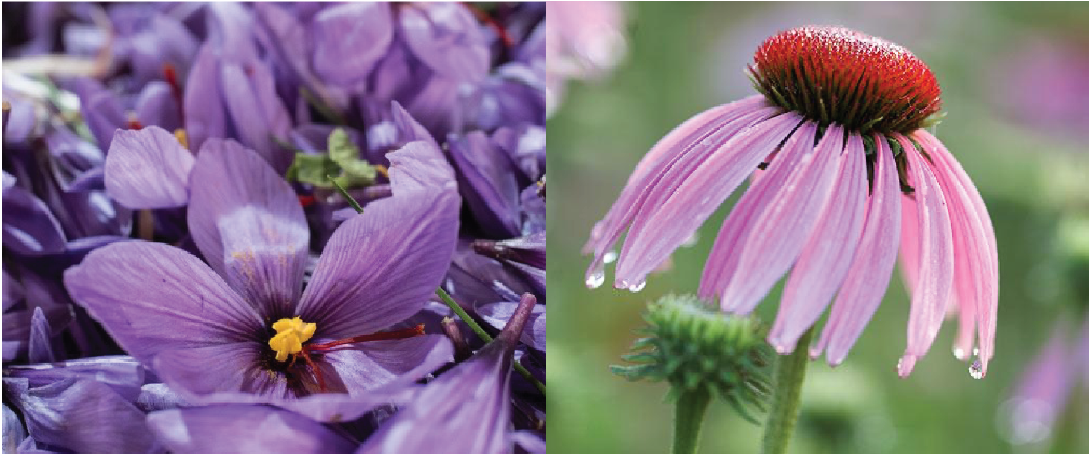The general level of worry and unhappiness in today’s world is bringing about an epidemic of stress. Stress is becoming part of the “new normal” for people.
While we can’t always change the stressors in our lives, we can control how we prepare for and manage stress. Beyond common effective ways to combat stress including physical activity, deep breathing and connecting with people, don’t overlook support from therapeutic botanicals. Saffron and echinacea are two herbs that show efficacy in supporting a range of effects of stress by promoting relaxation, a positive mood and emotional balance.
Botanicals exhibiting endocannabinoid properties
What else do these two botanicals have in common? Saffron and echinacea both engage the body’s endocannabinoid system, or “ECS” for short. Briefly, the function of the endocannabinoid system is to create overall balance in the body. Think of the ECS as the body’s dimmer switch. The ECS has been shown to be a critical regulator of the stress response.
Perhaps the most well-known plant that engages the endocannabinoid system is cannabis, or hemp, which produces cannabinoids that communicate information to regulate many systems in the body. But apart from cannabis, additional botanicals like saffron and echinacea have been studied and found to exert similar direct or indirect modulatory effects on the ECS, offering therapeutic potential.
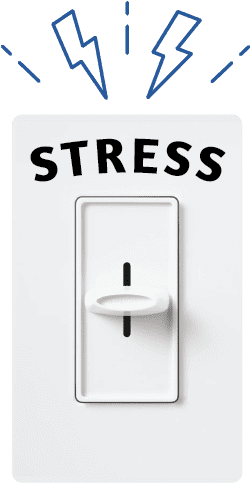
Saffron
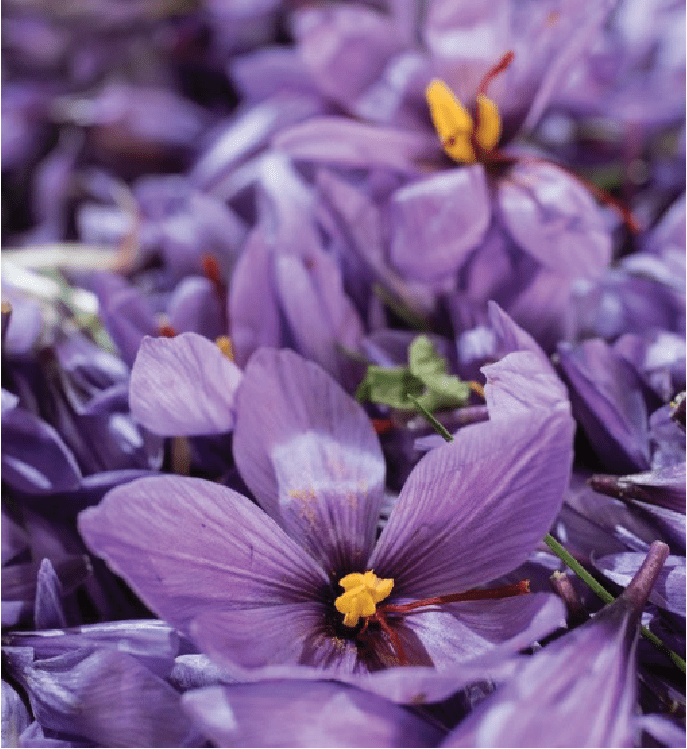
First, saffron is a versatile spice that’s been used in traditional medicine for centuries. It was used by Egyptian healers for gastrointestinal issues and even during Roman times for promoting wound healing and respiratory complaints. More recently in the literature, saffron has been shown to calm occasional irritability and stress, promote mental balance, maintain a healthy mood and support restful sleep.
Saffron acts mainly by increasing certain neurotransmitters such as dopamine, norepinephrine and serotonin. In addition, saffron has an antioxidant effect against excessive oxidative stress produced from stressful processes in the central nervous system. These mechanisms help saffron provide overall balance in mood and state of mind.
In a randomized, double-blind, placebo-controlled study using affron® saffron, a standardized saffron intake of 28mg/day for 4 weeks, significantly improved mood disorders and symptoms, such as tension, anger, depression, fatigue and confusion.
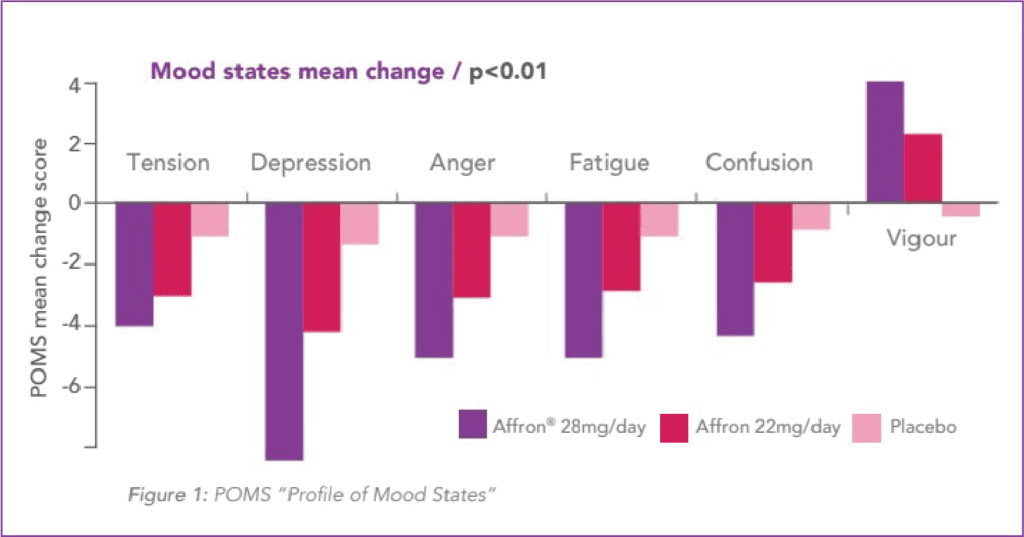
Research also shows that saffron can improve sleep quality and support restful sleep. In a double-blind, randomized controlled trial, a group of healthy adults aged 18–70 with sleep complaints either received saffron extract (14mg or 28mg, 1 hour before bed) or a placebo. After 28 days, results showed a 25% reduction of the Sleeplessness Severity Index Score, a 20% increase of the Restorative Sleep Questionnaire score, associated with feeling more energized after awakening, as well as a significant improvement in the PS-Derry score, related to alertness upon awakening.
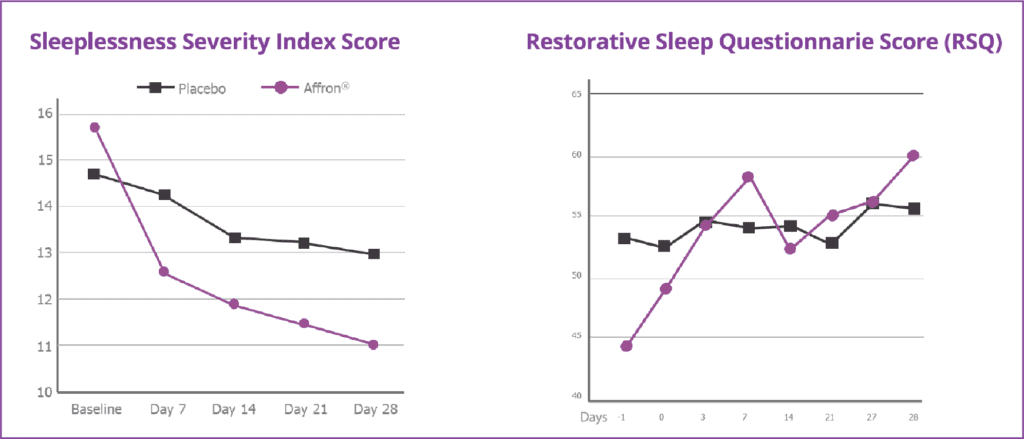
Echinacea
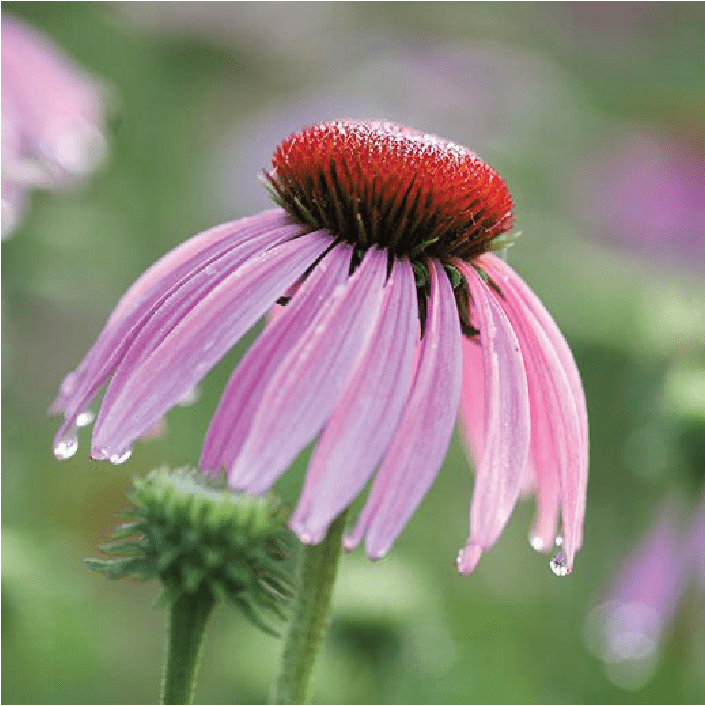
Next we have Echinacea angustifolia. Although it is commonly associated with immune system support, echinacea indeed includes certain active constituents— specifically, alkamides—that work directly with the ECS to produce an anxiolytic effect. Alkamides have been found to bind significantly to and activate the body’s cannabinoid receptors in the ECS, which regulate many physiological processes.
Alkamides are bioactive compounds that show structural similarity with anandamide, a key mediator for cannabinoid receptors. Anandamide is a neurotransmitter that binds to cannabinoid receptors in the brain and body, stimulating a sense of happiness and mental balance. In short, research suggests that echinacea contains key constituents that work directly with the cannabinoid receptors and neurotransmitters to promote better mood.
The mood-enhancing effects of Echinacea angustifolia were highlighted in a double-blind, randomized controlled trial where adults with mild-to-moderately severe anxiety received either placebo, 20 mg or 40 mg of echinacea angustifolia. Results were measured with the Positive and Negative Affect Schedule (PANAS) questionnaire – one of the most widely used scales to measure mood or emotion – and the Short-Form 36 (SF-36). Both doses of echinacea were associated with greater improvements in the PANAS positive and negative affect scores, and SF-36 emotional wellbeing score compared to the placebo. In fact, the anxiolytic effects from alkamides are believed to be associated with its influence on cannabinoid receptors (CB1 and CB2), both found in the brain.
Finding a Balance
Saffron and echinacea are good additions to a multi-faceted stress “toolkit.” These ECS botanicals provide calming support by promoting beneficial effects on key neurotransmitters that moderate mood and stress response, offering therapeutic potential to our central nervous system.
We cannot avoid stress. The good news? There are ways to reduce it.
Our body is well equipped to handle stress in small amounts, but when that stress becomes excessive and chronic, it can have serious negative effects on our health. The key is to incorporate self-care and tools to manage pressure and unease before we reach a point of feeling overwhelmed.
References
1. Almodóvar, P., Briskey, D., Rao, A., Prodanov, M., & Inarejos-García, A. M. (2020). Bioaccessibility and pharmacokinetics of a commercial saffron (Crocus sativus L.) extract. Evidence-Based Complementary and Alternative Medicine, 2020, 1–8.
2. Jackson, P. A., Forster, J., Khan, J., Pouchieu, C., Dubreuil, S., Gaudout, D., Moras, B., Pourtau, L., Joffre, F., Vaysse, C., Bertrand, K., Abrous, H., Vauzour, D., Brossaud, J., Corcuff, J. B., Capuron, L., & Kennedy, D. O. (2021). Effects of saffron extract supplementation on mood, well-being, and response to a psychosocial stressor in healthy adults: A randomized, double-blind, Parallel Group, clinical trial. Frontiers in Nutrition, 7.
3. Kell, G., Rao, A., Beccaria, G., Clayton, P., Inarejos-García, A. M., & Prodanov, M. (2017). AFFRON ® a novel saffron extract (Crocus Sativus L.) improves mood in healthy adults over 4 weeks in a double-blind, parallel, randomized, placebo-controlled clinical trial. Complementary Therapies in Medicine, 33, 58–64
4. Haller J, Krecsak L, Zámbori J. Double-blind placebo controlled trial of the anxiolytic effects of a standardized Echinacea extract. Phytother Res. 2020 Mar;34(3):660-668.
5. Woelkart, K., & Bauer, R. (2007). The role of Alkamides as an active principle of echinacea. Planta Medica, 73(7), 615–623.
6. Lopresti, A. L., Smith, S. J., & Drummond, P. D. (2021). An investigation into an evening intake of a saffron extract (affron®) on sleep quality, cortisol, and melatonin concentrations in adults with poor sleep: A randomised, double-blind, placebo-controlled, multi-dose study. Sleep Medicine, 86, 7–18.
6. Hohmann J, Rédei D, Forgo P, et al. Alkamides and a neolignan from Echinacea purpurea roots and the interaction of alkamides with G-protein-coupled cannabinoid receptors. Phytochemistry. 2011;72(14-15):1848-1853.

